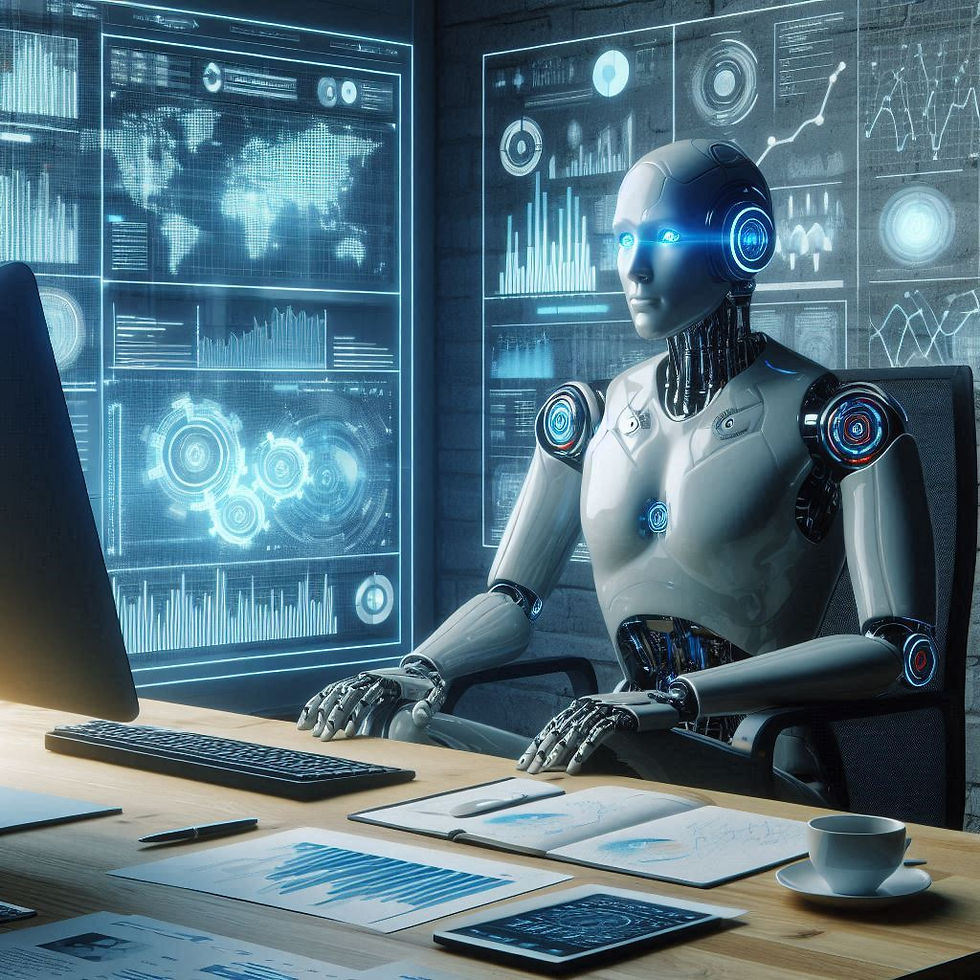Demystifying AI: A Layman's Guide to Understanding Artificial Intelligence
- Dec 7, 2024
- 5 min read
Updated: Feb 14, 2025

BLOG 8
Artificial Intelligence (AI) is transforming the way we interact with technology, representing a remarkable simulation of human intelligence in machines that can think, learn, and make decisions. From recognizing speech to understanding natural language and visual perception, AI encompasses a wide range of capabilities that have developed since its inception in the 1950s. Pioneers like Alan Turing laid the groundwork by introducing concepts such as the Turing Test, which assesses a machine's ability to exhibit intelligent behavior. Over the decades, advancements in computing power and machine learning have propelled AI from early symbolic reasoning to sophisticated systems that continuously improve through data. As we delve into the basics of AI, we'll explore its profound impact on our lives and the future, emphasizing the importance of embracing this technology.
Background of AI
Key Milestones:
1956: The term "Artificial Intelligence" was coined at the Dartmouth Conference, marking the birth of AI as a field.
1970s-1980s: Development of expert systems that could mimic human expertise in specific domains, such as medical diagnosis.
1997: IBM’s Deep Blue defeated world chess champion Garry Kasparov, showcasing the potential of AI in strategy games.
2010s: The rise of deep learning, a subset of machine learning that uses neural networks, significantly improved AI’s capabilities in image and speech recognition.
Current State of AI Today

Artificial Intelligence (AI) has become an integral part of modern life, permeating various sectors and transforming how we live and work. It is now woven into the fabric of our daily experiences, influencing everything from the way we communicate to how we manage our tasks. AI technologies, once confined to the realm of science fiction, are now a reality, seamlessly integrated into everyday applications that enhance our lives and streamline numerous processes.
In the realm of communication, for instance, AI powers virtual assistants like Siri and Alexa, enabling users to interact with their devices through natural language. These technologies not only facilitate hands-free operation but also learn from user preferences, providing personalized responses that improve over time. Similarly, AI algorithms are behind the recommendation systems of platforms like Netflix and Spotify, suggesting content based on individual tastes and viewing habits, thereby enriching our entertainment experiences.
In today's digital landscape, several AI platforms have emerged as valuable tools for everyday users seeking assistance with information gathering, writing, and understanding content. ChatGPT, developed by OpenAI, excels in conversational AI, enabling users to engage in natural language discussions, generate text, and summarize articles effectively. Gemini, a product from Google DeepMind, offers advanced capabilities in understanding context and providing insightful responses, making it a useful resource for research and comprehension. Co-Pilot, integrated into Microsoft products, assists users in writing by suggesting improvements, generating ideas, and even drafting documents, streamlining the creative process. Together, these platforms empower individuals to enhance their productivity and access information with ease.
Moreover, in the workplace, AI is revolutionizing industries by automating routine tasks, analyzing vast amounts of data, and providing insights that drive decision-making. For example, in healthcare, AI systems assist in diagnosing diseases by analyzing medical images more accurately than human experts, leading to timely and effective treatment plans. In finance, AI algorithms detect fraudulent transactions in real-time, enhancing security and trust in digital banking.
Beyond these applications, AI is also playing a crucial role in enhancing productivity and efficiency across various sectors. From manufacturing to logistics, AI-driven robots and systems optimize operations, reduce errors, and enable faster production cycles. As a result, businesses can respond more swiftly to market demands and customer needs, fostering innovation and competitiveness.
Ultimately, the integration of AI into everyday life signifies a profound shift in how we interact with technology and each other. It promises to continue evolving, offering new possibilities and challenges as it shapes the future of work, communication, and beyond.
Positive Impacts of AI
Healthcare: One of the most significant contributions of AI is in the healthcare sector. AI algorithms assist in diagnosing diseases by analyzing medical images, lab results, and patient histories. For example, AI tools can identify early signs of conditions like cancer or diabetes with remarkable accuracy, allowing for timely interventions. Additionally, AI is used to create personalized treatment plans by analyzing data from various sources, including genetic information and lifestyle factors, leading to more effective and tailored healthcare solutions.
Finance: In the financial sector, AI plays a pivotal role in fraud detection and risk management. AI systems analyze transaction patterns in real-time to identify suspicious activities, helping to prevent fraud before it occurs. Moreover, AI algorithms automate trading processes, making decisions based on market data at speeds unattainable by human traders. This not only increases efficiency but also enhances profitability by capitalizing on market fluctuations.
Everyday Applications: AI has also found its way into our homes and daily routines. Virtual assistants like Siri, Alexa, and Google Assistant help us manage our schedules, control smart home devices, and answer queries with ease. They can set reminders, provide weather updates, and even control lights and thermostats, making everyday tasks more convenient. Additionally, recommendation systems on platforms like Netflix and Spotify use AI to suggest content based on our preferences, enriching our entertainment experiences.
Negative Impacts of AI
While the benefits of AI are numerous, there are also significant challenges and negative impacts to consider:
Job Displacement: As AI automates tasks traditionally performed by humans, there is a growing concern about job displacement. Industries such as manufacturing, retail, and customer service are experiencing shifts as AI systems take over roles that involve routine tasks. This displacement can lead to economic instability for workers who may find it challenging to transition to new job roles that require different skills.
Privacy Concerns: The integration of AI in daily life raises serious privacy issues. Many AI applications rely on vast amounts of personal data to function effectively. For instance, voice-activated assistants continuously listen for commands, raising questions about data security and surveillance. The collection and analysis of personal data can lead to unauthorized use or breaches, making it crucial to establish robust privacy protections.
Bias and Discrimination: AI systems can inadvertently perpetuate biases present in their training data. This is particularly concerning in applications like hiring algorithms or credit scoring, where biased data can lead to unfair treatment of individuals based on race, gender, or socioeconomic status. Ensuring that AI is developed and implemented fairly is an ongoing challenge that requires attention and action.
Conclusion
The current state of AI reflects a technology that is deeply integrated into various aspects of our lives, offering both remarkable benefits and notable challenges. As AI continues to evolve, it will be essential to balance its advantages with the potential drawbacks, ensuring that we harness its power responsibly while addressing the ethical considerations that arise.
One of the key challenges lies in the potential for bias in AI algorithms, which can perpetuate inequalities if not carefully managed. Additionally, issues surrounding privacy and data security are paramount, as AI systems often rely on vast amounts of personal data to function effectively. It is crucial for developers and policymakers to implement robust frameworks that prioritize transparency and accountability in AI systems.
Moreover, as AI technologies advance, the workforce may undergo significant transformations, necessitating a proactive approach to workforce development and education. By investing in reskilling and upskilling initiatives, we can prepare individuals for the changing job landscape and ensure that the benefits of AI are widely distributed.
By being informed and engaged, we can navigate the complexities of AI and shape a future that maximizes its benefits for all. This requires collaboration among technologists, ethicists, lawmakers, and the public to create a shared vision for an AI-enhanced society that upholds human values and fosters innovation. Ultimately, the responsible development and deployment of AI will not only enhance our capabilities but also contribute to a more equitable and sustainable future.




Comments